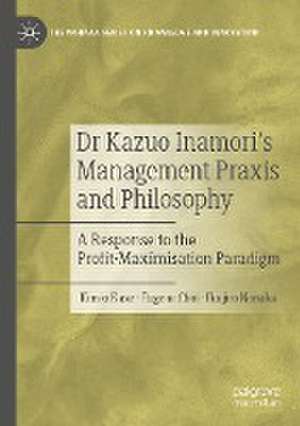Dr Kazuo Inamori’s Management Praxis and Philosophy: A Response to the Profit-Maximisation Paradigm: The Nonaka Series on Knowledge and Innovation
Autor Kimio Kase, Eugene Choi, Ikujiro Nonakaen Limba Engleză Paperback – sep 2023
| Toate formatele și edițiile | Preț | Express |
|---|---|---|
| Paperback (1) | 650.69 lei 6-8 săpt. | |
| Springer Nature Singapore – sep 2023 | 650.69 lei 6-8 săpt. | |
| Hardback (1) | 656.25 lei 6-8 săpt. | |
| Springer Nature Singapore – 31 aug 2022 | 656.25 lei 6-8 săpt. |
Preț: 650.69 lei
Preț vechi: 765.51 lei
-15% Nou
Puncte Express: 976
Preț estimativ în valută:
124.52€ • 129.84$ • 103.49£
124.52€ • 129.84$ • 103.49£
Carte tipărită la comandă
Livrare economică 20 martie-03 aprilie
Preluare comenzi: 021 569.72.76
Specificații
ISBN-13: 9789811934001
ISBN-10: 9811934002
Pagini: 561
Ilustrații: XXXI, 561 p. 32 illus., 12 illus. in color.
Dimensiuni: 148 x 210 mm
Greutate: 0.7 kg
Ediția:1st ed. 2022
Editura: Springer Nature Singapore
Colecția Palgrave Macmillan
Seria The Nonaka Series on Knowledge and Innovation
Locul publicării:Singapore, Singapore
ISBN-10: 9811934002
Pagini: 561
Ilustrații: XXXI, 561 p. 32 illus., 12 illus. in color.
Dimensiuni: 148 x 210 mm
Greutate: 0.7 kg
Ediția:1st ed. 2022
Editura: Springer Nature Singapore
Colecția Palgrave Macmillan
Seria The Nonaka Series on Knowledge and Innovation
Locul publicării:Singapore, Singapore
Cuprins
Chapter 1 Introduction.- Chapter 2 Inamori Management Philosophy: Schematic representation.- Chapter 3 Kazuo Inamori.- Chapter 4 Ideology and Rules.- Chapter 5 Leadership.- Chapter 6 Amoeba Management and hourly profit system (AMS).- Chapter 7 Inamori’s strategy analysed through financial statements: Inception-1981, 1973-1974, 1974-1979, 1979-1983, 1983-1985, and 1973-1989.- Chapter 8 Kyocera’s Accounting system.- Chapter 9 Inamori Management and Amoeba Management Systems in the light of Management control literature.- Chapter 10 Conclusions and Discussions.
Notă biografică
Kimio Kase, an ex-president of International University of Japan, of which he is emeritus professor. Doctorate of Business Administration, Manchester University. Degrees from IESE, ICADE, etc. A visiting professor at China Europe International Business School (CEIBS), Rikkyo University, Yonsei University, and International Christian University (I.C.U.), etc. Author of varied management topics.
Eugene Choi, a professor of innovation and business history at Ritsumeikan University. A PhD and M.Phil. from the University of Cambridge and an M.B.A. from Bayes Business School, University of London, and a B.A. from Waseda University. Corporate education and regional triple helix projects in Japan, the U.K., and Southeast Asia. The research director at the Ritsumeikan Inamori Research Center. A visiting professor at the National Tsinghua University, etc. Currently a senior faculty affiliate at Marshall Business School of the University of Southern California.
Ikujiro Nonaka, Professor Emeritus of Hitotsubashi University. A widely recognised pioneer in the theory of Knowledge-based Management. A Xerox Distinguished Faculty Scholar of the University of California since 1997 and belongs to the Fellows Group of the Academy of Management in the United States since 2002, as its first Asian scholar. Ex-Dean of the Graduate School of Knowledge Science, Japan Advanced Institute of Science and Technology. A professor (1982–95) and Director (1995–98) at the Institute of Business Research, Hitotsubashi University.
Textul de pe ultima copertă
This book offers a meditation on the links between philosophy and its implementation, interpreting why and how a leader's "philosophy" strengthens his action predicated on the purposeful vision of life; and discusses the a hypothesis that performance control in management may be driven by transcendental and intrinsic motivations, contrasting with the traditional management control theory. It construes how Inamori's management philosophy disciplines accounting and finance management towards putting its basic tenets into practice. Examining, in particular, the history of Kyocera, the authors provide a contemplative look at a human centric philosophy, which will be of interest to scholars of management, corporate executives, and economists with a philosophical bent.
Caracteristici
A management philosophy that offers an alternative to the profit maximisation paradigm Explores a heart-felt human-centric management philosophy closely knit with praxis Provides insight into cross-cultural management




